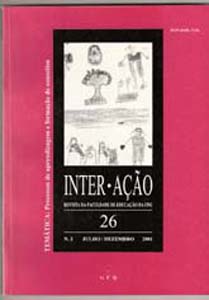PRODUÇÕES VERBAIS ESTRANHAS EM AQUISIÇÃO DE LINGUAGEM: QUESTÕES LEVANTADAS PELA SINGULARIDADE DA FALA DA CRIANÇA
DOI:
https://doi.org/10.5216/ia.v26i2.1602Abstract
Visando a uma maior compreensão dos processos de aquisição de linguagem, o objetivo básico do presente estudo foi o de aprofundar a análise de produções verbais da criança, as quais provocam, no adulto, um efeito de estranhamento, na tentativa de diferenciar os vários modos em que tais produções poderiam se apresentar. Nesse sentido, foram analisados os dados verbais de uma díade mãe-filho, destacando-se um tipo de produção singular da criança que ocorria numa atividade discursiva de jogos simbólicos. Um tal tipo de produção – caracterizado, basicamente, pelo espelhamento imediato de estruturas do discurso da mãe – foi discutido como um efeito heterogêneo do funcionamento da língua, em seus processos metafóricos e metonímicos.Downloads
Downloads
Published
How to Cite
Issue
Section
License
Inter-Ação uses the Creative Commons Attribution 4.0 License for Open Access Journals (Open Archives Initiative - OAI) as the basis for the transfer of rights. Open access means making documents available on the Internet free of charge, so that users can read, download, copy, distribute, print, search, or link to the full text of documents, process them for indexing, use them as input data for software programs, or use them for any other lawful purpose, without financial, legal, or technical barriers.
Authors publishing in this journal agree to the following conditions:
1) Authors retain copyright and grant the journal the right of first publication, with the work simultaneously licensed under the Creative Commons Attribution License, which permits redistribution of the work with attribution and first publication in this journal.
2) Authors are permitted to enter into additional, separate agreements for non-exclusive distribution of the version of the work published in this journal (e.g., for publication in an institutional repository or as a book chapter), with attribution and first publication in this journal.
3) Authors are permitted and encouraged to publish and distribute their work online (e.g. in institutional repositories or on their home page) at any time before or during the editorial process, as this may generate productive changes as well as increase the impact and citation of the published work.















